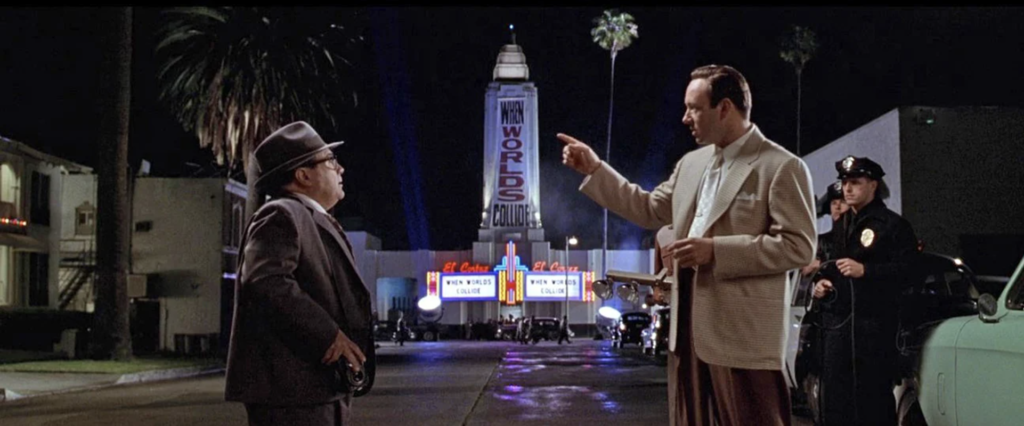L.A. Confidential is a Christmas movie. It begins with a real event—1951’s “Bloody Christmas” beating of seven prisoners in the L.A. jail—and springboards from there into a sprawling epic weaving police corruption, show business, and scandal together into three, four, or five (I lose count every time I watch it) intertwining stories.
L.A. Confidential is an ambitious American movie. It was also the Best Picture of 1997—not the best picture of 1997, but it was the best of the five Oscar nominees for Best Picture by a long shot. Alas, the 70th Academy Awards ended up being the Titanic show, so the only major awards Curtis Hanson’s film won were for Kim Basinger (Best Supporting Actress) and for Hanson’s and Brian Helgeland’s script. (Hot tip: if you want to know the best films in any given year, look for the winners of Best Screenplay.)
There is so much baggage loaded onto the roof of L.A. Confidential, which plays like an alternate history of Hollywood. What if someone took over Mickey Cohen’s racket after he went to prison? What if Confidential magazine (called Hush Hush in the movie) and “Dragnet” were part of it? What if Lana Turner dated mobster Johnny Stompanato? Wait, they did, and both make appearances in L.A. Confidential in an amusing scene. But the film rests on the breakout performances of Russell Crowe and Guy Pearce. Both play unlikeable characters with opposite ethical frameworks who somehow meet in the middle. In cynical fashion, these moral worldviews slowly bend and break under the strain of the real world. Watching both characters wrestle with the rigid codes they created is one of the joys of the movie.
Kevin Spacey rounds out the trio with a flashy vice cop who lives for highly publicized arrests, and while his journey is similar, it’s not as dramatic as Pearce’s Ed Exley or Crowe’s Bud White. Two other elements stood out to me—one is the shooting and lighting strategy, which both acknowledged and avoided film noir tropes. I’ve watched this film numerous times and seem to remember it as a noir callback, but no, the lighting is very high-key. The L.A. of L.A. Confidential is mostly sunny until the final gun battle. I’m a fan of a good gunfight, and I rank the Victory Motel shootout among the best. It’s full of fear, tension, brutality, and violence. It has stakes, unlike the enjoyable but danger-free shootouts in the John Wick movies. The combatants struggle to reload their low-capacity Colt Detective Special revolvers and Ithaca police shotguns. This is a battle of wills, not gear.
The other element that struck me when re-watching L.A. Confidential with my Gen Z kids is how long it took the plot to get going. As a screenwriter, we are told time and again to make a splash on page one. (It used to be page ten.) The Nite Owl massacre isn’t revealed until a full thirty minutes in, and even then it’s hazy how this scene connects with everything that’s come before. There is an arrest, an interrogation, a jailbreak, and a shootout that results in possibly unjustified deaths, but all that turns out to be a red herring. To get satisfaction, you need to stay off your phone and keep watching. This should be no problem for movie fans. But in today’s attention-challenged age, some effort may be required.
This is a film that demands you stick with it, just as the three main cop characters follow their threads until they meet at the knot. You cannot enjoy the reveal unless you have struggled with the puzzle. Think of it as an intricately-wrapped gift clad in paper lovingly saved by your parents, a call back to a bygone era, but tied up with new, shiny ribbon. My family once watched Man on Fire and my boys remarked on how refreshing it was that the movie spent a whole hour building the relationship between Denzel Washington’s and Dakota Fanning’s characters. So they were not impatient with L.A. Confidential, but reported there was no way most of their peers would sit through it—my college age son mentioned his friend fell asleep during Dune Part One. I weep for moviegoers such as them.
Curtis Hanson is an underrated director who worked on literary adaptations (Wonder Boys and L.A. Confidential), potboilers starring A-listers (The River Wild and The Hand That Rocks the Cradle) and two unexpectedly linked films about spoken word poetry (In Her Shoes and 8 Mile). I seem to gravitate toward filmmakers who work in a multiplicity of genres, like Peter Hyams and Billy Wilder. There is often a commonality in how they approach their varied subjects. Discovering that artist’s signature is part of the fun. I like Hanson’s way with characters undergoing parallel interior and exterior discoveries. Watching L.A. Confidential is like opening a present from Santa Claus, only instead of a Nintendo, you get corruption, gangs, and prostitution.
Merry Christmas.

